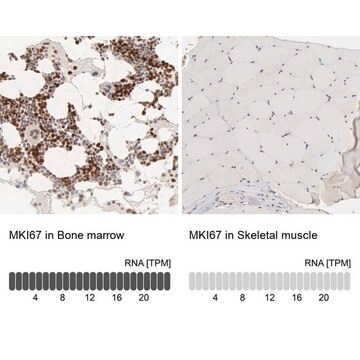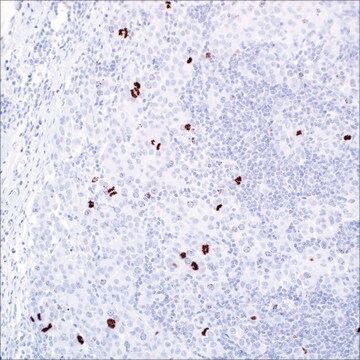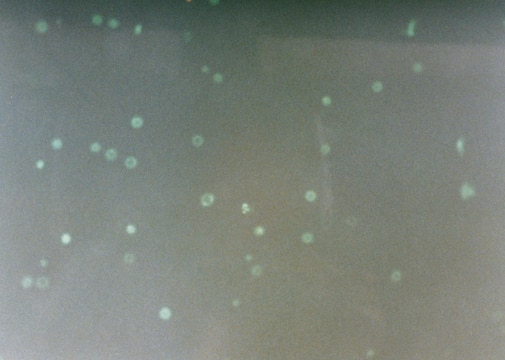P6834
Monoclonal Anti-Proliferating Cell Protein Ki-67 antibody produced in mouse
clone PP-67, ascites fluid
Sinónimos:
Anti-Ki-67
About This Item
Productos recomendados
origen biológico
mouse
conjugado
unconjugated
forma del anticuerpo
ascites fluid
tipo de anticuerpo
primary antibodies
clon
PP-67, monoclonal
contiene
15 mM sodium azide
reactividad de especies
human
técnicas
immunoblotting: suitable
immunohistochemistry (formalin-fixed, paraffin-embedded sections): 1:800 using microwave-treated human tonsil sections
microarray: suitable
isotipo
IgM
Nº de acceso UniProt
Condiciones de envío
dry ice
temp. de almacenamiento
−20°C
modificación del objetivo postraduccional
unmodified
Información sobre el gen
human ... MKI67(4288)
Categorías relacionadas
Descripción general
Especificidad
Inmunógeno
Aplicación
Immunocytochemistry (1 paper)
Immunocytochemistry.
Monoclonal Anti-Proliferating Cell Protein Ki-67 antibody produced in mouse has also been used for immunohistochemistry.
Acciones bioquímicas o fisiológicas
Cláusula de descargo de responsabilidad
¿No encuentra el producto adecuado?
Pruebe nuestro Herramienta de selección de productos.
Código de clase de almacenamiento
10 - Combustible liquids
Clase de riesgo para el agua (WGK)
nwg
Punto de inflamabilidad (°F)
Not applicable
Punto de inflamabilidad (°C)
Not applicable
Elija entre una de las versiones más recientes:
¿Ya tiene este producto?
Encuentre la documentación para los productos que ha comprado recientemente en la Biblioteca de documentos.
Los clientes también vieron
Artículos
Cell based assays for cell proliferation (BrdU, MTT, WST1), cell viability and cytotoxicity experiments for applications in cancer, neuroscience and stem cell research.
Nuestro equipo de científicos tiene experiencia en todas las áreas de investigación: Ciencias de la vida, Ciencia de los materiales, Síntesis química, Cromatografía, Analítica y muchas otras.
Póngase en contacto con el Servicio técnico













